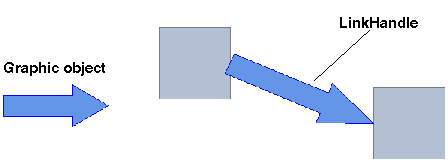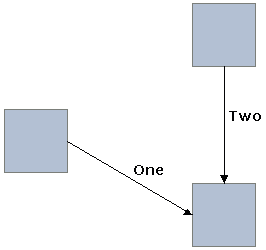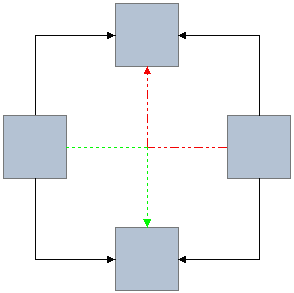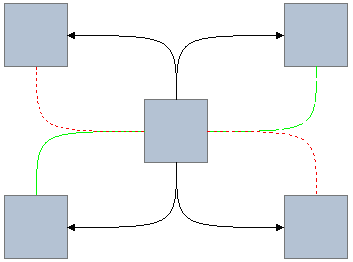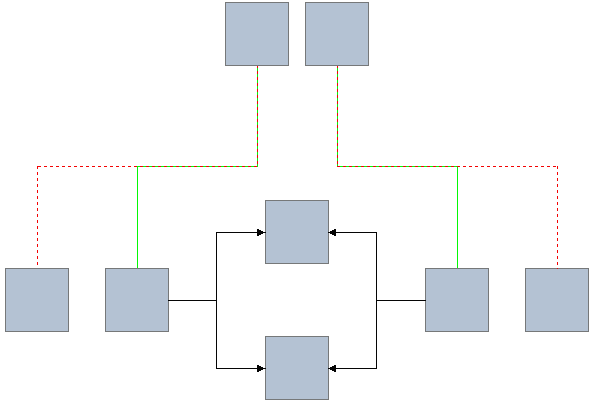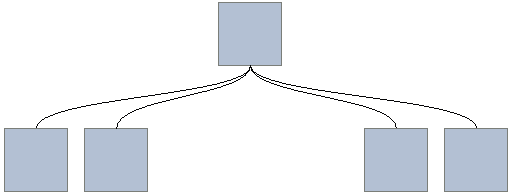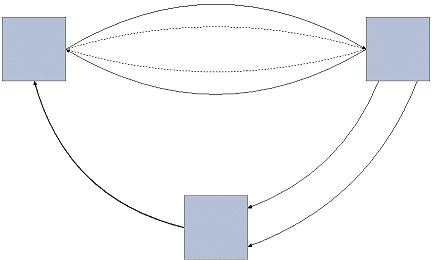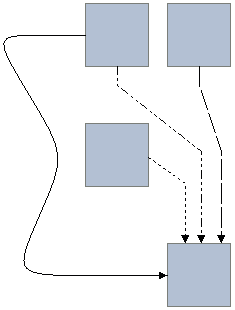Predefined Grapher Links
Predefined link classes are available in the grapher library. Each of these classes adds a specific behavior or drawing functionality to the
IlvLinkImage base class. You can either use these classes as they are or subclass them to create customized links. The following classes are available:
IlvLinkHandle
The
IlvLinkHandle class is an example of a link class where the shape and behavior of the link are directly inherited from
IlvLinkImage, and where only the drawing of the link has been redefined.
This class lets you reference any type of graphic object to make it behave as a grapher link. Also, a graphic object can be referenced by several
IlvLinkHandle instances. This allows you to create very lightweight links with complex shapes.
Figure 2.3 illustrates an example of an
IlvLinkHandle instance referencing a polygon:
Figure 2.3 Graphic Objects Used as a Link
The constructor of this class is as follows:
IlvLinkHandle(IlvDisplay* display, IlvGraphic* object, IlvGraphic* from, IlvGraphic* to, IlvDim width = 0, IlBoolean owner = IlTrue IlvPalette* palette=0); |
Once added to the grapher, this instance will draw the graphic object object as a link between the nodes from and to, using the width width. The owner parameter describes the relationship between the handle and its referenced object. When a handle owns its referenced object, the handle is responsible for deleting this object. This means that you can safely share a referenced object as long as it is not owned by any of its handles.
An example showing how to use the
IlvLinkHandle class is provided in the
<ILVHOME>/samples/grapher/linkhand directory.
IlvLinkLabel
The
IlvLinkLabel class also inherits the shape and behavior of the
IlvLinkImage class. Links of the
IlvLinkLabel type can be labelled with a user-defined character string.
This string can be specified by means of the
label parameter of the constructor. It can also be specified once the link is created, by using the
IlvLinkLabel::setLabel method.
Figure 2.4 Labelled Links
IlvOneLinkImage
The
IlvOneLinkImage class derives from the
IlvLinkImage class and defines a new shape and a new behavior. Instances of this class are composed of two perpendicular lines, as illustrated in
Figure 2.5:
Figure 2.5 IlvOneLinkImage
The shape of the link depends on its
orientation property, which indicates whether the link that leaves the
from node starts out vertically (
IlvVerticalLink) or horizontally (
IlvHorizontalLink). This property can be specified in the constructor or it can be specified once the link is created, by using the
setOrientation method.
IlvOneSplineLinkImage
This class is a subclass of
IlvOneLinkImage that draws the link as a spline:
Figure 2.6 IlvOneSplineLinkImage
The position of the end points is similar to the one computed in the
IlvOneLinkImage class. The two control points of the drawn spline are both at the intersection of the start and end tangents of the link. You can modify the position of the double-control point by using the
setControlPoint method.
IlvDoubleLinkImage
The
IlvDoubleLinkImage class derives from
IlvLinkImage and defines a new shape and a new behavior. Instances of this class are composed of three connected lines intersecting at a 90° angle, as illustrated in
Figure 2.7.
Figure 2.7 IlvDoubleLinkImage
The layout of the three segments follows two modes that are set with the
setFixedOrientation method:

Automatic - The orientation of the segments depends on the vertical and horizontal separation between the two nodes. The middle segment takes the orientation of the largest separation.

Fixed - The orientation of the link is fixed and specifies the direction (horizontal or vertical) the link takes upon leaving the starting node.
IlvDoubleSplineLinkImage
The
IlvDoubleSplineLinkImage class is a subclass of
IlvDoubleLinkImage that draws the links with smooth curves instead of straight segments, as shown in
Figure 2.8. The behavior of these links is the same as in the
IlvDoubleLinkImage class.
Figure 2.8 IlvDoubleSplineLinkImage
IlvArcLinkImage
The
IlvArcLinkImage class is a subclass of
IlvLinkImage that defines a new shape and a new behavior. Links of this type are drawn as an arc joining the two nodes, as shown in
Figure 2.9:
Figure 2.9 IlvArcLinkImage Joining Three Nodes
The arc is drawn as a spline with two control points. The distance between these control points and the segment joining the end points of the link (also called the arc offset) can be specified with one of the following:

A value proportional to the length of the segment, using the
setOffsetRatio method.
This arc offset can take negative values, in which case the control points are located on the right of the oriented segment joining the start and end points. You can therefore connect two nodes with several links without any overlapping, by using different arc offsets.
IlvPolylineLinkImage
This class lets you dynamically define the intermediate points of a link. These points are stored in each
IlvPolylineLinkImage instance and can be specified using several methods:
As with all link classes, the resulting shape is computed in the
IlvPolylineLinkImage::getLinkPoints method. You can also specify whether the link is to be drawn with straight segments or with curves by calling the
drawSpline method.
Figure 2.10 shows an example of the free-form links created by
IlvPolylineLinkImage instances:
Figure 2.10 IlvPolylineLinkImage
Version 5.5.1
Copyright © 2012, Rogue Wave Software, Inc. All Rights Reserved.
